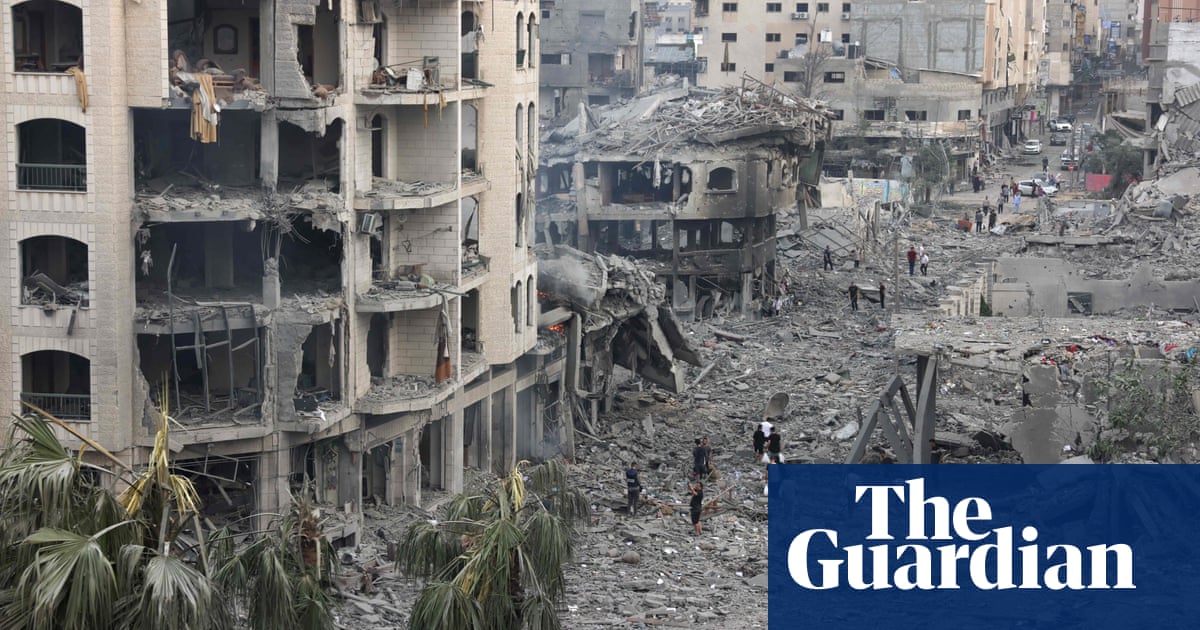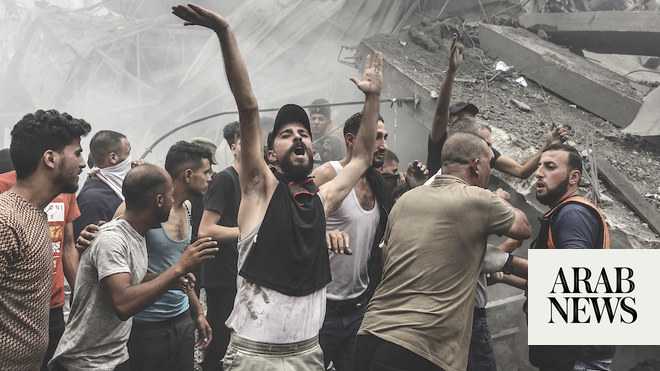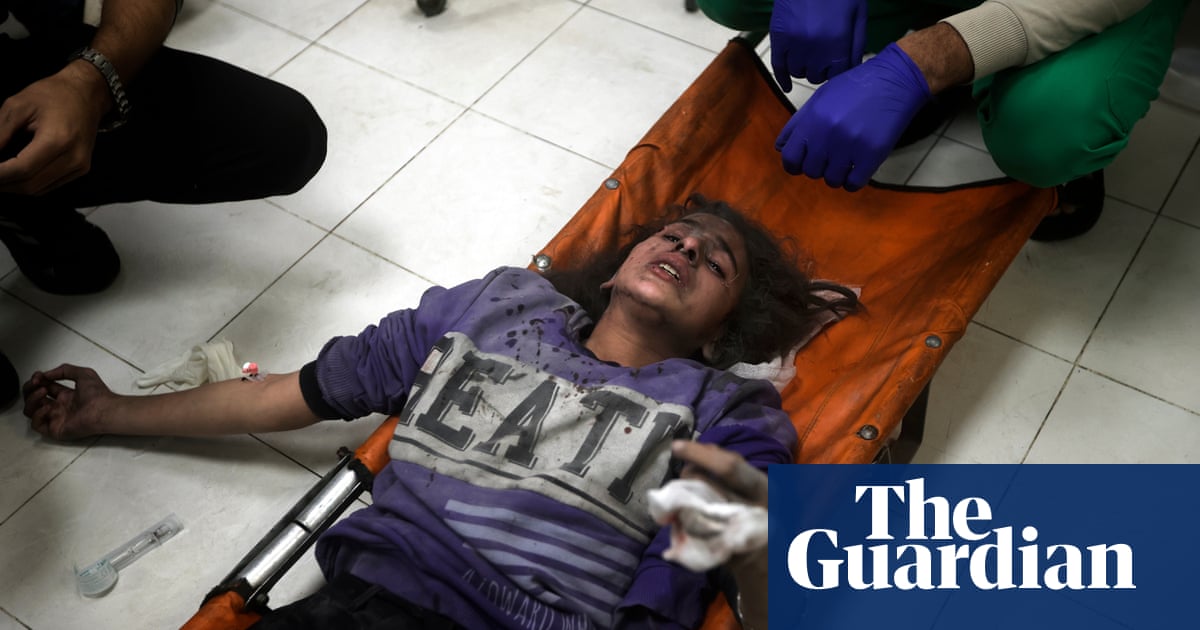
A massive Israeli military buildup was continuing along Gaza’s border on Tuesday, as the country’s military confirmed the death toll from Saturday’s Hamas attack – the deadliest militant assault in its history – had passed 1,000 and wave after wave of airstrikes hit the territory.
Amid mounting expectations that Israel would launch a ground invasion of Gaza within days, Israeli soldiers were still collecting bodies of the dead four days after Hamas rampaged through southern Israeli towns in the deadliest terrorist attack in the country’s history.
The Israeli military said it had mostly secured its border with Gaza after a night of intensified airstrikes across the enclave that destroyed infrastructure and displaced thousands of people. The Gaza health authority has put the death toll in the enclave at 900 since Saturday.
In a sign of the rapidly escalating crisis, a salvo of rockets from Hezbollah-controlled southern Lebanon was fired at northern Israel, leading Israeli forces to return fire in the third consecutive day of violence along the Lebanese-Israeli border. The Israeli military also shelled Syria from the Golan Heights after mortar rounds were fired into the territory. Two Palestinians were shot dead by police in East Jerusalem.
Evidence of the scale of Saturday’s horror has continued to emerge, including in the southern kibbutz of Be’eri, where more than 100 bodies have been retrieved, about 10% of the community’s population.
In Kfar Aza kibbutz, bodies of Israeli residents and Hamas militants lay on the ground beside strewn furniture and torched cars as Israeli soldiers went from house to house to take away the dead.
“You see the babies, the mothers, the fathers, in their bedrooms … It’s not a war, it’s not a battlefield. It’s a massacre,” said Israeli Maj Gen Itai Veruv, escorting journalists at the scene. “It’s something that we used to imagine from our grandfathers, grandmothers in the pogrom in Europe and other places.”
In Washington, Joe Biden condemned Hamas, denouncing its attack as an “act of sheer evil” and expressing his horror at “sickening” reports of torture inflicted on innocent civilians.
“Our hearts may be broken but our resolve is clear,” the US president said. He added: “Let there be no doubt. The United States has Israel’s back. We’ll make sure the Jewish and democratic state of Israel can defend itself today, tomorrow as we always have.”
As hundreds of Israeli tanks and other military vehicles converged on muster points around Gaza, hundreds of thousands of reservists were travelling to join their units, with an Israeli military spokesperson saying its forces were installing “an iron wall” along the border of the besieged coastal enclave.
The huge scale of the mobilisation suggests Israel is preparing for a far more substantial military attack against Hamas in Gaza than in the previous rounds of fighting, which claimed thousands of Palestinian lives.
Mairav Zonszein of the International Crisis Group said: “This is clearly preparation for a major ground invasion. I don’t think there’s any basis in understanding how that will either bring back the captives or get rid of Hamas.”
About 150 people are believed to be being held captive by militants in Gaza, with Hamas threatening to start executing its hostages if Israel carried out airstrikes without warning.
The country’s military said on Tuesday that it had recovered the bodies of more than 1,500 Hamas fighters inside Israel, giving the clearest indication yet of the scale of the weekend’s assault.
A Guardian journalist who drove down Israel’s 234 highway to Re’im, close to the border with Gaza, described hearing rocket fire and seeing the bodies of five Hamas militants, who had been stripped to check for explosives, lying in the open.
Israeli warplanes hammered the Gaza Strip neighbourhood on Tuesday, reducing buildings to rubble as people scrambled to find safety. It followed what the military said were hundreds of targets struck overnight in the wealthy al-Rimal district of Gaza City, home to ministries of the Hamas-run government, as well as universities, media organisations and the offices of aid organisations.
Residents left their homes to find buildings torn in half by airstrikes or reduced to mounds of concrete. Cars were flattened and trees burned out on residential streets.
Radwan Abu al-Kass, a boxing instructor, said he had been one of the last to evacuate his five-storey building in al-Rimal after the area came under attack. He finally left when a missile hit the building, which was destroyed by a bigger strike after he got out. “The whole district was just erased,” he said.
Three Gaza journalists were killed when an Israeli missile hit a building while they were outside reporting, bringing the number of journalists killed to six.
Amid warnings from UN agencies of looming humanitarian catastrophe in Gaza, home to 2.3 million people, Lt-Col Richard Hecht, an Israeli military spokesperson, advised Palestinians to “get out” of Gaza through the Rafah crossing with Egypt on its southern border, before clarifying that the crossing remained closed.
Gaza’s sole border crossing with Egypt, the only entry point not controlled by Israel, was hit by an Israeli airstrike on Tuesday for the third time in 24 hours, an Egyptian NGO said.
Aid organisations have pleaded for the creation of humanitarian corridors to get aid into Gaza, saying hospitals overwhelmed with wounded people were running out of supplies. Israel has stopped all food, fuel and medicines to Gaza.
The World Health Organization said there had been 11 attacks on healthcare sites, which included medical facilities, ambulances and care providers, in the first 36 hours of the new conflict in Gaza. “There is an urgent need to establish a humanitarian corridor for unimpeded, life-saving patient referrals and movement of humanitarian personnel and essential health supplies,” the WHO said.
The UN agency for Palestinian refugees said that more than 187,000 people had been displaced across the Gaza Strip, with that number expected to increase.
Ali Barakeh, a member of Hamas’s exiled leadership in Beirut, said the group was prepared for a prolonged war. “We have prepared well for this war and to deal with all scenarios, even the scenario of the long war,” he said, adding that Hamas intended to exchange Israeli hostages held in Gaza for Palestinians held in Israeli jails, and even some in the US.
Barakeh’s comments came after statements by another senior Hamas official, Moussa Abu Marzouk, who told the broadcaster Al Jazeera that the group was open to discussing a possible truce with Israel after having “achieved its targets”.
The escalating conflict on Israel’s borders is increasing concern that the violence could spread.
The Egyptian president, Abdel Fatah al-Sisi, said on Tuesday that the escalation of hostilities between Israel and Palestinian militant groups in Gaza was “very serious”, warning of repercussions on the region’s “security and stability”.
Sisi, whose government maintains ties with Israel and Hamas, said Egypt had intensified its efforts to reach a ceasefire, according to the state-run Mena news agency. “We are communicating with all international and regional parties in order to reach an immediate cessation of violence and achieve de-escalation,” he was quoted as saying.
The Egyptian leader affirmed Egypt’s position on establishing a “just and comprehensive peace” based on a two-state solution.








